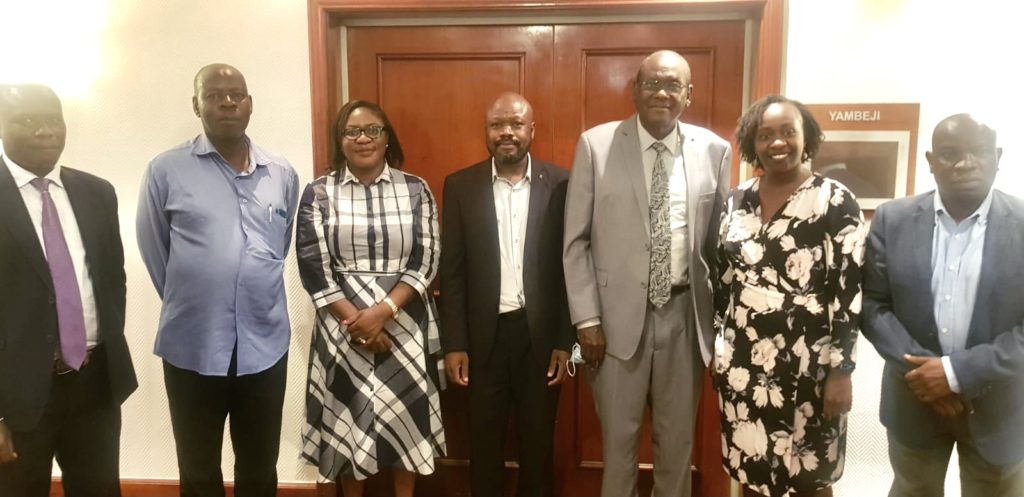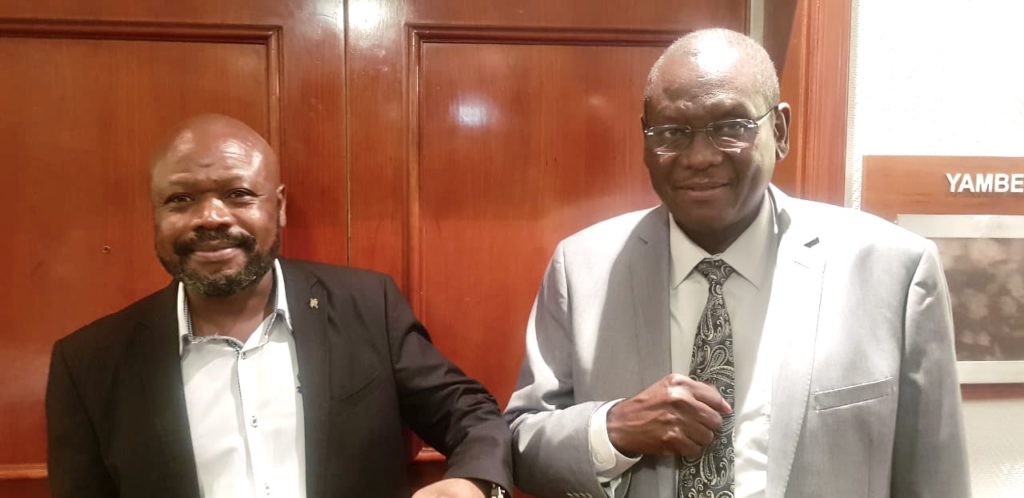On 7 March 2022, a delegation of the Food, Agriculture and Natural Resources Policy Analysis Network (FANRPAN), led by the CEO and Head of Mission, Dr. Tshilidzi Madzivhandila, met with the representatives of the Common Market for Eastern and Southern Africa (COMESA) in Lusaka, Zambia to share lessons and promote the uptake of the outputs of its flagship project, the ‘Agricultural and Food System Resilience: Increasing Capacity and Advising Policy’ (AFRICAP). The COMESA delegation consisting of Ms. Providence Mavubi (Director – Industry and Agriculture), Ms. Esther Mwimba, (Senior Private Sector Development Officer), and Mr. Joel Okwir (Agriculture Economist) was headed by Amb. Dr. Kipyego Cheluget, the assistant Secretary General, who was representing the regional economic community’s (REC) Secretary General, Hon. Chileshe Kapwepwe. The FANRPAN delegation consisted of Mr. Francis Hale, the Director for Policy Advocacy and Communications, Mr. Ian Mashingaidze, the network’s Regional Coordinator for the integrated Future Estimator for Emissions and Diets (iFEED) framework, and the network’s Zambia Node Coordinator, Mr. Masiye Nawiko, who is also the Executive Director for the Agriculture Consultative Forum (ACF).

The meeting was a scheduled policy advocacy event that enabled FANRPAN to share the activities and outputs of the AFRICAP project, which is coming to an end in March 2022. With COMESA being a key REC in Africa, having twenty-one member states stretching from Tunisia to Eswatini, it was imperative that FANRPAN shares the outputs and the lessons learnt from the AFRICAP project to influence policy and practice; promote broader uptake beyond the four countries in which the project was implemented; as well as ensuring sustenance beyond the programme’s lifespan. Funded by the UK Government’s Global Challenges Research Fund (GCRF) to the tune of £9.2 million, the Agricultural and Food-System Resilience: Increasing Capacity and Advising Policy (AFRICAP) worked through three related strands – scenario planning workshops, cross-disciplinary research, and an integrated assessment framework to enhance the productivity, sustainability, and resilience of sub-Saharan African agriculture and food systems to climate change. The implementation was co-led by FANRPAN and the University of Leeds, along with local organizations and government ministries from the respective countries and successfully created an evidence base to underpin new country-specific agriculture and food systems policies.

Presenting the outputs, Mr. Mashingaidze, FANRPAN’s iFEED Regional Coordinator, explained the attributes of the iFEED framework, a key output of the GCRF-AFRICAP programme. iFEED is an integrated assessment framework that combines climate and crop models, expert knowledge, and stakeholder perspectives to build climate-smart, nutrition-secure pathways in Sub-Saharan Africa. From the research and stakeholder engagements, key outputs included country summaries and regional syntheses focusing on four topical issues, namely, nutrition and food security; agricultural resilience; land use and land reform; and commercialization of agriculture.
Dr Madzivhandila also chipped in, highlighting how the AFRICAP project enabled the generation of evidence through structured multi-disciplinary policy research and analysis; the building of the capacity for both individuals and institutions from national, regional and global levels to improve their translation of evidence-based policy options; and its stimulation of debate and dialogue. The CEO commended the GCRF-AFRICAP’s model for enabling co-creation and co-implementation amongst the various project stakeholders, and the mutual respect between the project partners from the global north and global south, as well as between state and non-state actors.
In response to the presentation, Amb. Cheluget acknowledged FANRPAN’s efforts and the contributions of the AFRICAP programme, and indicated that the outputs were coming at an opportune time, when COMESA member states are currently developing their second-generation National Agriculture Investment Plans (NAIPs). The Assistant Secretary General applauded FANRPAN’s contribution to ensuring that policies would be evidence-based, and that FANRPAN was targeting many countries and RECs to promote adoption and use of iFEED and other AFRICAP outputs. In closing, Amb. Cheluget paved the way for FANRPAN to collaborate with members of his technical team in a joint program to retail the AFRICAP outputs to COMESA members states
In his closing remarks, Dr. Madzivhandila thanked COMESA for according FANRPAN the opportunity to share lessons learnt and outputs from the AFRICAP project.
